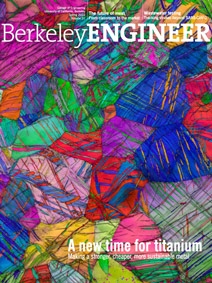Dean’s note: Public partners in innovation
Core to Berkeley Engineering’s mission is to serve the public good, and this past year has seen the launch of new partnerships with state and local agencies that exemplify this ethos.
You can read about one example of collaboration with public partners in this issue of Berkeley Engineer. Kara Nelson, professor of civil and environmental engineering, and Rose Kantor, assistant research engineer, have led the effort to monitor wastewater for the SARS-CoV-2 virus on campus and throughout the Bay Area. The technique their team developed to detect the virus and its variants is not only very sensitive and fast, but also doesn’t require difficult-to-source materials. Working with more than 20 local wastewater agencies, they were able to detect the Omicron variant before it showed up in clinical samples. They have made their data available to the public at covid-web.org.
Close collaborations with public partners are key to the success of research programs, helping us translate results into practical benefit.
The Berkeley researchers have received state funding to transition their wastewater monitoring system to the California Department of Public Health, as part of its long-term public health surveillance program, and they are now applying what they’ve learned from monitoring the SARS-CoV-2 virus to other infectious agents, including the influenza virus.
Another public partnership is helping us better prepare for a world that is grappling with the effects of climate change. The spring 2021 issue of Berkeley Engineer featured civil and environmental engineering professor Kenichi Soga’s innovative use of advanced sensor technologies. Since then, Soga has been serving as special advisor to the dean for resilient and sustainable systems, and led the establishment of the Center for Smart Infrastructure in partnership with the East Bay Municipal Utility District (EBMUD). This new center focuses on research to address risks associated with aging infrastructure systems posed by climate change and natural hazards, and talks are underway to include other public utilities as partners.
Close collaborations with public partners are key to the success of these research programs, helping us translate research results into practical benefit. I look forward to a better future shaped by these and other innovations created by Berkeley Engineers, one that is healthier and more sustainable for all members of our global society.
Fiat Lux!

Tsu-Jae King Liu
Dean and Roy W. Carlson Professor of Engineering

